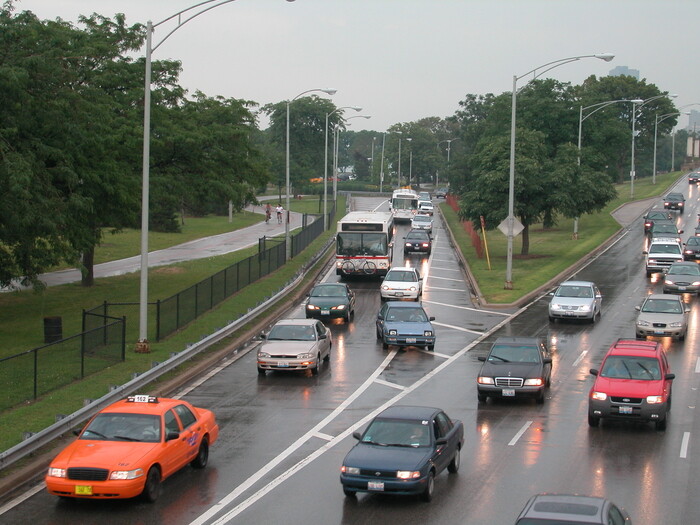Did You Know?
RTA Board should voice support for transit on Chicago’s lakefront

The reconstruction of North DuSable Lake Shore Drive (NDLSD) presents a once-in-a-generation opportunity to have an impact on Chicago’s transportation landscape for better or worse.
As the NDLSD project team prepares to announce their preferred design, the Regional Transportation Authority (RTA) Board has a critical role to play in supporting high-quality transit solutions for this project.
For years, advocacy groups and residents have called for a forward-thinking approach that moves away from the highway-centric model and embraces dedicated space for public transit.
However, there are growing concerns that the preferred design will not include improving transit options on our treasured lakefront, ignoring the urgent need for reducing the highway’s carbon footprint.
In recent weeks, elected officials have leveraged their leadership to call for a different path forward, including a letter from lakefront city council members urging a halt to the project and resolutions passed by the Illinois General Assembly insisting on a transit-oriented approach.
As the public officials entrusted with one of our most important strategies for fighting climate change, the RTA Board has a moral responsibility to champion bold, visionary solutions that reduce single-occupancy vehicle trips and encourage transit use.
With the NDLSD announcement imminent, the Active Transportation Alliance has formally asked the RTA Board to seize this pivotal moment. To ensure that our request was heard loud and clear, we provided testimony that was read into the official record at the agency’s board meeting this week.
By vocally supporting dedicated transit infrastructure along the lakefront, the RTA Board can help ensure this project looks to cleaner future rather than getting stuck in the past.
Here’s the letter from Active Transportation Alliance Executive Director Amy Rynell to the RTA Board:
———————————-
Dear Chairman Dillard and members of the Regional Transit Authority (RTA) Board of Directors:
Today, we are here to ask for your vocal support as we fight to head off a potentially short-sighted and harmful decision for our region’s transit and quality of life.
The Illinois Department of Transportation (IDOT), alongside partners at Chicago Department of Transportation (CDOT), Chicago Transit Authority (CTA), and other public sector stakeholders, have for years been conducting a planning study to determine a path forward on the urgently needed reconstruction of North DuSable Lake Shore Drive (NDLSD).
We have learned that the project team is preparing to announce a preferred design that doubles down on maintaining a highway alongside our treasured lakefront. This determination is moving forward despite a decade of advocacy from dozens of organizations and thousands of residents calling for a more forward-thinking approach to rebuilding NDLSD, one that prioritizes walking, biking, and transit in face of the clarion call for action on climate change.
NDLSD is the highest bus ridership corridor in the city alongside the densest neighborhoods in the city. It presents an ideal opportunity to implement a transformative solution like bus rapid transit. This project holds the potential to reshape our city’s transportation landscape for the next century, offering a chance to embrace innovative solutions that will resonate for generations to come.
The last few weeks have seen numerous elected officials leverage their leadership to call for a different solution, including a letter from more than a dozen lake front city council members calling for a halt to the project and resolutions passed by both chambers of the Illinois General Assembly insisting on a different path forward.
We urge the RTA Board to champion the vital need for dedicated transit infrastructure along the lake front. As a pivotal opportunity to reshape our city’s transportation landscape, it’s imperative that we create dedicated space for reliable, fast, desirable public transportation. We must redesign NDLSD — indeed the entirety of DuSable Lake Shore Drive — to prioritize transit.
In many ways, the NDLSD project has brought into focus everything that is broken about our region’s ability to plan a meaningful response to the climate crisis. At the project’s outset over 10 years ago, instead of putting forth a truly visionary set of goals, the project leaders opted for the politically expedient but environmentally disastrous route of maintaining highway capacity despite the clear need to increase mobility options and reduce the number of trips by single occupant vehicles in our region.
And so, due to this short-sighted set of project parameters, the NDLSD project team has been given the wrong problem to solve. By committing to improving conditions for all roadway users, including drivers, the project team has constrained the potential for prioritizing high-quality transit solutions.
Since then, we have been engaged in a public debate that is set on artificial terms where we must hold the needs of drivers as equal to those of people who depend on transit, walking, or biking to move around. This runs counter to our obligation to reduce single occupancy vehicle trips.
It is our moral responsibility to plan for a future where people are encouraged to drive less and use more sustainable alternatives like transit. While the RTA Board’s direct authority over this project may be limited, it’s incumbent upon you, as the public officials entrusted with wielding one of our greatest weapons against the threat of climate change, to push back against this decision.
Because the announcement is imminent, we urge you to take swift and decisive action by weighing in. We implore you, as influential voices within the RTA Board, to seize this moment and champion a bold vision — a future where high-quality transit options flourish along our iconic lakefront corridor.
Sincerely,
Amy Rynell
Executive Director
Make a Donation
Your tax-deductible donation supports the important work that Active Trans does throughout the region
